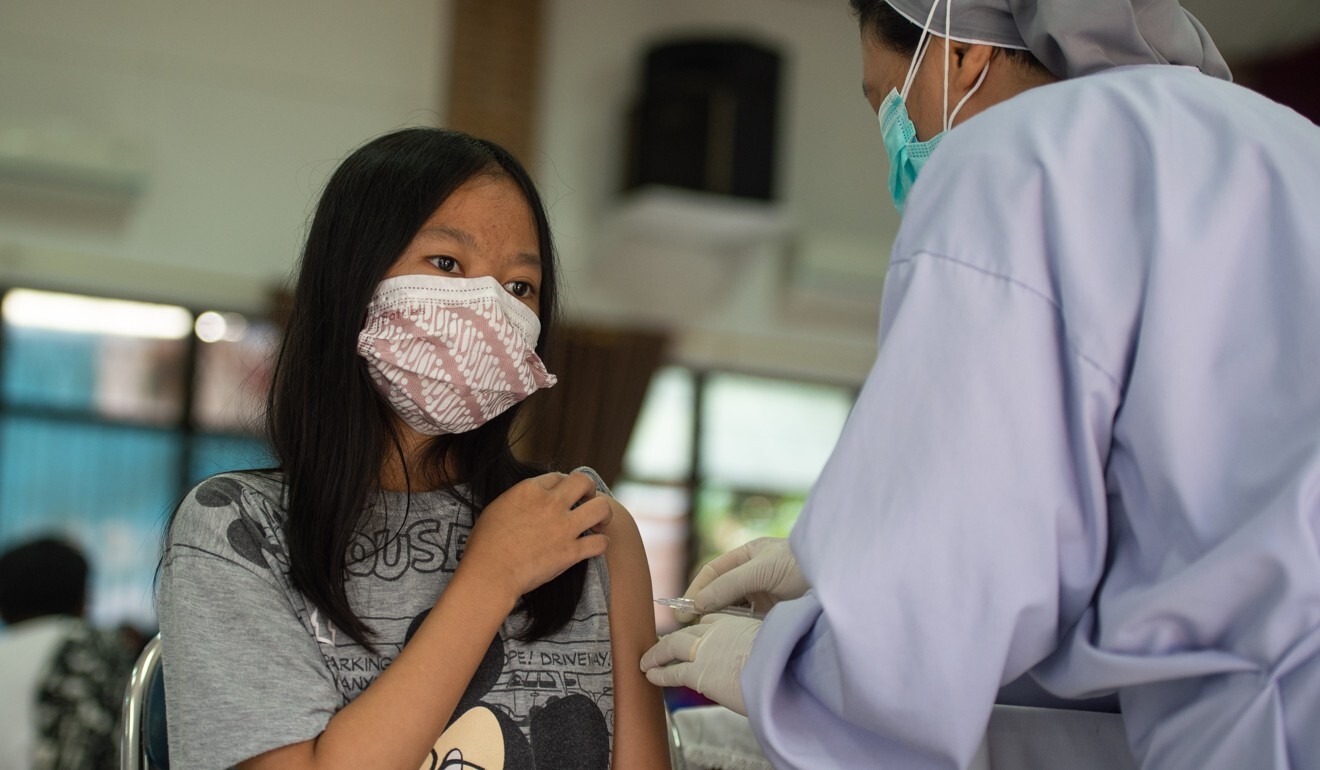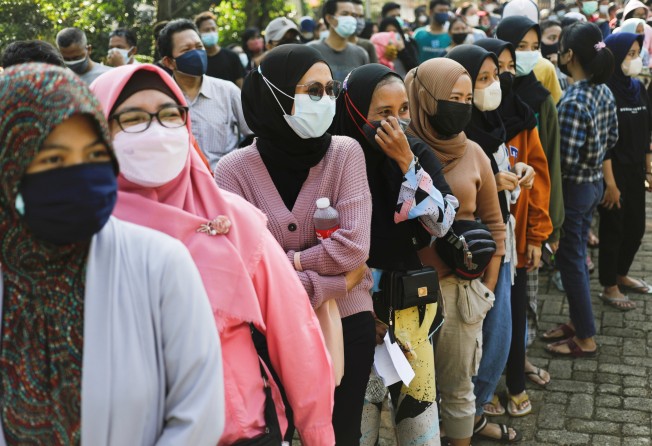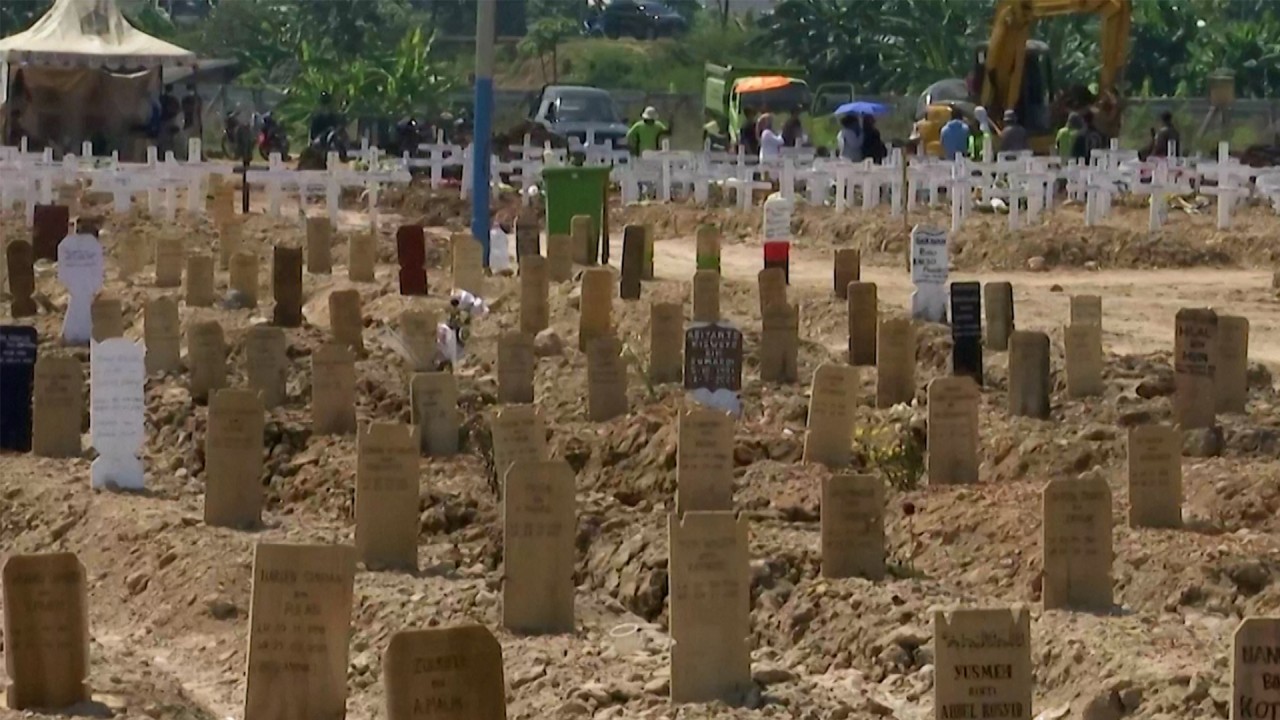
Red tape hinders Indonesia’s vaccination drive, even as Covid-19 cases surge
- Numerous reports of Indonesians running up against red tape in their bid to get vaccinated have surfaced, despite a ramped up inoculation drive
- Analysts say unequal access to vaccines risks prolonging the pandemic in Indonesia, which has seen daily infections surpass 40,000 in recent days

When Indonesian national Maria Caritas went to the city of Surabaya two weeks ago to get her first shot of Covid-19 vaccine, she was turned away.
Staff at the vaccination centre told the 21-year-old fresh university graduate that she needed a “letter of domicile” from the chief of her neighbourhood in Surabaya, as her electronic identity card, or e-KTP, had been issued in Malang, where she lived more than a decade ago. Non-Surabaya residents could not be jabbed without the letter as “the vaccines were bought with the city government’s money”, she was told. Caritas currently lives with her parents in Sidoarjo, about 40 minutes away.
The requirement left Caritas bewildered given that Indonesia’s government has been promoting its mass vaccination campaign – that aims to inoculate 70 per cent of people by December – as a way for Southeast Asia’s largest economy to properly reopen. Only about 7 per cent of the country’s 270 million population have been fully vaccinated so far, according to the Health Ministry.

Indonesia has secured more than 173 million vaccine doses, bought with the state budget, with the vast majority – 126.5 million – coming from China’s Sinovac.
“I spent more than an hour on the road and then an hour in the queue and still I was denied the jab. If I can only get the jab in Malang, I will have to wait until the current [partial lockdown] is over,” Caritas said, referring to movement curbs in place across the country that were set to expire at the end of the week.
Similarly, in the tourist island of Bali which has one of the highest vaccination rates alongside the capital Jakarta, I Gusti Ayu Indyani and her cousin were told to bring a photocopy of the latter’s e-KTP in order to get a jab. Indyani, who had been vaccinated earlier in the year, said the episode became a living nightmare for her cousin, who was initially hesitant to get the jab as she dreaded the “complicated bureaucracy”.
The pair eventually found a shop with a photocopier after 10 minutes of driving around and headed back to the vaccination centre. “Why does it have to be so complicated?” the 27-year-old health worker said in exasperation.
Numerous reports of Indonesians running up against red tape in their bid to get vaccinated have surfaced, even as President Joko Widodo set an ambitious target of inoculating up to 5 million people a day – up from his previous target of 2 million daily doses.
Widodo on Friday told a group of small entrepreneurs that people were “screaming” for virus restrictions to end and for economic activity to restart. Indonesia has more than 70 million informal workers who have bore the brunt of several waves of movement curbs to stem outbreaks. But the fallout from the pandemic has already dragged 3 million people below the poverty line, wiping out years of progress in expanding the country’s middle class.

02:14
Indonesia mourns coronavirus victims as daily death toll reached another record high
On Thursday, a coalition of 15 marginalised communities, led by the Indigenous Peoples’ Alliance of the Archipelago (AMAN), published an open letter to Widodo demanding equal access to the vaccines, particularly for those who do not possess citizenship registration numbers, which would mean they do not have a e-KTP.
Many indigenous people, orphaned children and those who are homeless do not have such registration numbers, the group said. And while indigenous people were largely protected from the first wave of infections last year because of their isolation from large urban centres, the Delta variant had broken through and more cases were being detected in communities in Borneo, South Sulawesi and the Maluku Islands, AMAN said.
By its estimate, of the 70 million indigenous people in Indonesia, only around 468,000 of them have registered for vaccination, with some 20,000 having received the first dose.
“There were some family clusters who died during self-isolation because health facilities and services were out of their reach. However, the detailed number of positive cases is still unknown as tests and tracing are not proper in remote areas,” the letter said.
Coronavirus does not care about one’s citizenship identity card
Hermawan Saputra, a member of the Indonesian Public Health Experts Association, said that unequal access to the vaccines would risk prolonging the pandemic in Indonesia, which has seen daily infection numbers surpass 40,000 in recent days. On Friday, the death toll rose by 1,759 to 92,311.
“People in the high-risk zones must be vaccinated, as coronavirus does not care about one’s citizenship identity card. The requirements should not be lengthy,” he said.
“Many Indonesians in the United States were vaccinated, and they were only tourists, not a resident let alone a citizen. If the vaccines are available, then it’s better if all people in high-risk zones in Indonesia are inoculated.”
While AMAN demanded that the government accept letters of residence from neighbourhood or indigenous community chiefs in lieu of citizenship registration numbers, authorities said the e-KTP was still a must.
But there was no need for photocopies of the e-KTP or a letter of domicile, said Siti Nadia Tarmizi, a spokeswoman for Indonesia’s Covid-19 vaccination programme.
She said vaccinations were being done by different organisations, such as government agencies, health centres and private groups, which explained the varying rules.
“The government’s guideline is for participants to just show the original KTP [at a vaccination centre]. The organisers should follow the technical guidelines laid out by the Health Ministry,” Siti said